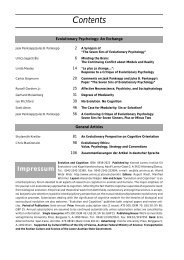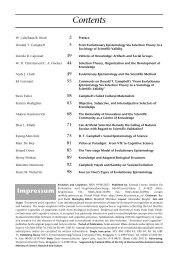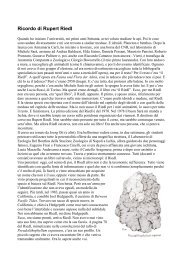Contents - Konrad Lorenz Institute
Contents - Konrad Lorenz Institute
Contents - Konrad Lorenz Institute
You also want an ePaper? Increase the reach of your titles
YUMPU automatically turns print PDFs into web optimized ePapers that Google loves.
Steve Stewart-Williams<br />
Darwin and Descartes’ Demon<br />
On the Possible Evolutionary Origin of<br />
Belief in an External World<br />
Without any reasoning, or<br />
even almost before the use<br />
of reason, we always suppose<br />
an external universe<br />
which depends not on our<br />
perception but would exist<br />
though we and every sensible<br />
creature were absent or<br />
annihilated. (HUME 1955,<br />
Section XII, Part I)<br />
Those cousins of our ancestors<br />
who could not manage<br />
to learn that there was<br />
an independently existing<br />
‘external world,’ one whose<br />
objects continued on trajectories<br />
or in place even when<br />
unobserved, did not fare as<br />
well as those who quickly<br />
recognized obdurate realities.<br />
(NOZICK 1993, p121)<br />
How can we be certain<br />
that our senses provide us<br />
with an accurate picture<br />
of the world How can we<br />
be certain that there really<br />
is an objective world<br />
at all, and that all our experience<br />
is not simply a vivid dream or hallucination<br />
These questions relate to one of the most fundamental<br />
and long-standing issues in philosophy:<br />
the problem of justifying belief in an external<br />
world. The goal of this article is not to resolve this<br />
difficult philosophical conundrum. My focus is psychological<br />
rather than philosophical, and I will simply<br />
assume what many philosophers believe is impossible<br />
to prove: that there is an external world,<br />
causing our perceptions and existing independently<br />
Abstract<br />
This article explores the possibility that the tendency<br />
to believe in an objective, mind-independent external<br />
world traces to innate aspects of the human mind. The<br />
aspects of mind in question are, first, the capacity to<br />
distinguish mental states that have objective referents<br />
from those that do not (e.g., perceptual states versus<br />
mental imagery), and second, the capacity to mentally<br />
represent the continued existence of parts of the world<br />
that are beyond the reach of the senses. It is proposed<br />
that the evolutionary function of these cognitive abilities<br />
relates to the production of novel but adaptive voluntary<br />
behaviour. Evidence and arguments are<br />
provided in support of the innateness hypothesis.<br />
Among these is a Chomskyan-style poverty-of-thestimulus<br />
argument derived from the philosophical literature.<br />
The evolutionary account of the subjective-objective<br />
distinction leads to the prediction that, in<br />
conditions of uncertainty, people will tend to err on the<br />
side of assuming the objectivity of their perceptions<br />
and other judgements.<br />
Key words<br />
Evolutionary psychology, external world, innate ideas,<br />
object permanence, objective-subjective distinction,<br />
philosophy.<br />
of them. In making this<br />
assumption so casually, I<br />
am engaging in precisely<br />
the phenomenon that is<br />
the focus of the article.<br />
My contention is that the<br />
most intuitively plausible<br />
position on this issue for<br />
the vast majority of humankind<br />
is metaphysical<br />
realism, the view that<br />
there is an independently<br />
existing external world. A<br />
number of philosophers<br />
have suggested that the<br />
disposition to form this<br />
view is a part of human<br />
nature (HUME 1978;<br />
NOZICK 1993; PUTNAM<br />
1981). In this article, I<br />
provide a preliminary<br />
and highly speculative<br />
sketch of how these suggestions<br />
might ultimately<br />
be placed within an evolutionary<br />
psychological<br />
framework. I explore the<br />
possibility that the assumption<br />
of an external<br />
world relates to certain innate aspects of the human<br />
mind (that is, aspects that were not derived solely<br />
from experience, but can be traced, at least in part,<br />
to information contained in materials of the developmental<br />
process, in particular the genes; for further<br />
discussion of innateness, see STEWART-WILLIAMS<br />
submitted). My goal is not to establish this position<br />
beyond reasonable doubt. I will be content if I can<br />
show simply that the position is not unreasonable,<br />
and provide the groundwork for further discussion.<br />
Evolution and Cognition ❘ 123 ❘ 2003, Vol. 9, No. 2








